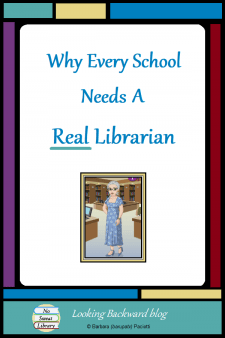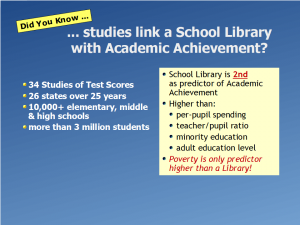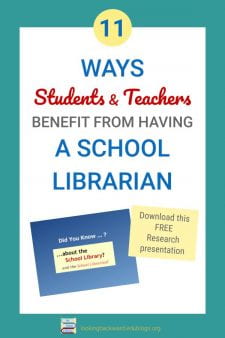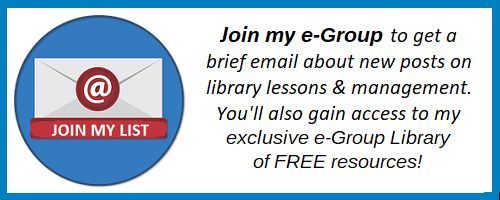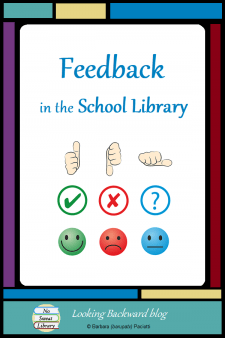 Giving feedback is one of the most misunderstood aspects of teaching. Many teachers confuse feedback with grading. Feedback is not a grade, nor written comments on an assessment rubric or finished project. Feedback is what we give a student before grading an assignment.
Giving feedback is one of the most misunderstood aspects of teaching. Many teachers confuse feedback with grading. Feedback is not a grade, nor written comments on an assessment rubric or finished project. Feedback is what we give a student before grading an assignment.
Feedback can be in many forms, but whatever the method, it’s main purpose is to guide a student toward overcoming misunderstandings and errors as they work to achieve the learning goal.
BACKGROUND ON FEEDBACK
Before I became a school librarian I taught Biology, Chemistry, and Physical Science for 8 years in an at-risk alternative high school. In order for students to receive high school credit in a course, they had to get at least a B grade on every single assignment. Believe me, when you take a 14-year-old with a 3rd-grade reading level through 2 semesters of high school biology and end up with one of the best culminating essays you’ve ever read, you’ve developed a lot of feedback strategies! What I learned about feedback during my years with these discouraged students is exactly what researchers have confirmed:
- Feedback focuses on specific knowledge and/or skills.
- Feedback shows a student how to improve to get to where they need to be—and the how may need to be different for each student.
- Feedback comes regularly throughout the learning process.
- Feedback is upbuilding and interactive between student and teacher.
I admit that the alternative setting allows for a lot more direct, hands-on feedback and guidance than a regular classroom setting, but there are a number of feedback strategies that can be used with larger groups of students without overwhelming a teacher. You may not realize you are already using the feedback mechanisms on this short list of direct student-teacher interaction and between-students interaction (so you can observe & provide direct feedback as needed):
| Direct Student-Teacher Interaction | Between-Students Interaction |
|
|
FEEDBACK FOR LIBRARY LESSONS
It may surprise you that I still use the same feedback strategies for my Library Lessons. It’s a little more challenging to provide feedback within a single class period, and maybe not interact with those students again for awhile. So the most important point about feedback is that it isn’t just from student to teacher, to see what they’ve learned; it requires the teacher to respond back to the student with some specific guidance. 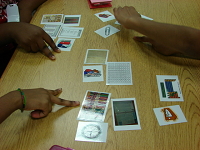
For example, in some lessons I ask students to locate a resource in the library, like a particular book on a shelf. They raise their hands when it’s located, and a teacher or I tell them if it’s correct or we guide them toward figuring out why it’s not, then allow them to find the correct location. Specific, timely, direct. And quickly done even with two full classes of students.
I use a lot of graphic organizers, hands-on interactives, and student discussion for Library Lessons. The teachers and I can roam the library tables listening and guiding students during the activity to make sure they’re achieving the purpose of the lesson.
An Exit Ticket is a great ending to a Library Lesson—and a great daily grade for the teacher—but it isn’t feedback unless we do something with it by responding to students about it at their next visit. Even a quick quiz can be feedback if it’s checked and discussed in a timely manner.
FEEDBACK FOR OVERDUE BOOKS
School Librarians can consider an overdue notice as feedback, if done as such. Many librarians run overdue notices on a regular basis—weekly or every other week—to be handed out to students in a class or homeroom. I abandoned that practice. I do run overdue notices at the end of each semester in order to clear students for exams, as required by my principal, but otherwise, I have a better solution.
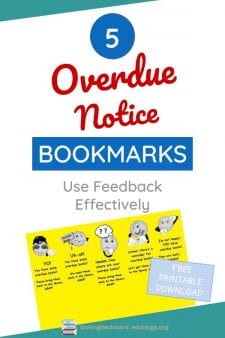 I created a set of funny overdue notice bookmarks. When a student comes to check out a book and I see they have an overdue:
I created a set of funny overdue notice bookmarks. When a student comes to check out a book and I see they have an overdue:
- I grab an overdue bookmark
- I write the title of the overdue book on it
- I put it inside their current book
all the while chatting them up about finding and returning that overdue book. With a bookmark, the student sees it every time they read their current book, and whether at school or home, it reminds them to find and return the overdue book.
You can download my overdue bookmark template
from the FREE Librarian Resources page.
Another strategy is to invite the student to use my phone at the circulation desk to call their home or their own phone and leave a voice message about the overdue. When they or their parents get home and check messages, the reminder prompts a search for the overdue book to be returned the next day. The bookmark or the phone call takes a little more time, but both are specific and timely, direct between the student and I, and upbuilding rather than demoralizing. The knowledge/skill I am building with these two strategies? How to be organized and responsible.
GAME IT!
In an article from the Association for Supervision and Curriculum Development’s (ASCD) article on Feedback, the author writes:
According to Prensky (2007), the addictiveness of video games can be partly attributed to the constant stream of feedback they provide. At each level of the game, players learn what works and what doesn’t, and they can immediately use that knowledge to advance to more challenging levels. And researchers have found that the same dynamic applies in education: One of the most powerful keys to unlocking student motivation and perseverance is feedback.
If we tackle feedback as if making a game of it, we can design innumerable pleasant and productive strategies to use in the classroom or in the school library.
Here’s another excellent article that can provide some insight on feedback: Why Giving Effective Feedback Is Trickier Than It Seems.
With so much research support for feedback, it makes sense for every educator to use feedback, and, more importantly to use it correctly, to build student knowledge and skills!


